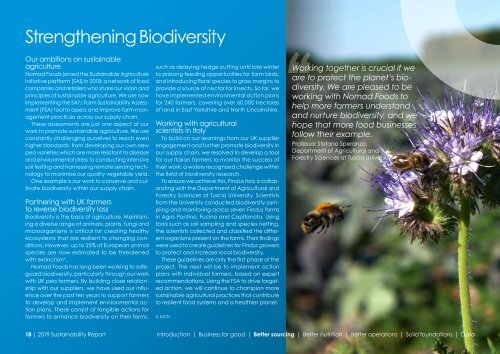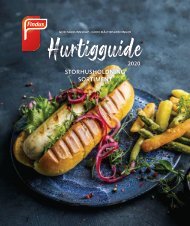Bærekraftsrapport 2019- Findus Norge/Nomad Foods
Create successful ePaper yourself
Turn your PDF publications into a flip-book with our unique Google optimized e-Paper software.
Strengthening Biodiversity<br />
Our ambitions on sustainable<br />
agriculture<br />
<strong>Nomad</strong> <strong>Foods</strong> joined the Sustainable Agriculture<br />
Initiative platform (SAI) in 2018: a network of food<br />
companies and retailers who share our vision and<br />
principles of sustainable agriculture. We are now<br />
implementing the SAI’s Farm Sustainability Assessment<br />
(FSA) tool to assess and improve farm management<br />
practices across our supply chain.<br />
These assessments are just one aspect of our<br />
work to promote sustainable agriculture. We are<br />
constantly challenging ourselves to reach even<br />
higher standards, from developing our own new<br />
pea varieties which are more resistant to disease<br />
and environmental stress to conducting intensive<br />
soil testing and harnessing remote sensing technology<br />
to maximise our quality vegetable yield.<br />
One example is our work to conserve and cultivate<br />
biodiversity within our supply chain.<br />
Partnering with UK farmers<br />
to reverse biodiversity loss<br />
Biodiversity is the basis of agriculture. Maintaining<br />
a diverse range of animals, plants, fungi and<br />
microorganisms is critical for creating healthy<br />
ecosystems that are resilient to changing conditions.<br />
However, up to 25% of European animal<br />
species are now estimated to be threatened<br />
with extinction 3 .<br />
<strong>Nomad</strong> <strong>Foods</strong> has long been working to safeguard<br />
biodiversity, particularly through our work<br />
with UK pea farmers. By building close relationship<br />
with our suppliers, we have used our influence<br />
over the past ten years to support farmers<br />
to develop and implement environmental action<br />
plans. These consist of tangible actions for<br />
farmers to enhance biodiversity on their farms,<br />
such as delaying hedge cutting until late winter<br />
to prolong feeding opportunities for farm birds,<br />
and introducing floral species to grass margins to<br />
provide a source of nectar for insects. So far, we<br />
have implemented environmental action plans<br />
for 240 farmers, covering over 60,000 hectares<br />
of land in East Yorkshire and North Lincolnshire.<br />
Working with agricultural<br />
scientists in Italy<br />
To build on our learnings from our UK supplier<br />
engagement and further promote biodiversity in<br />
our supply chain, we resolved to develop a tool<br />
for our Italian farmers to monitor the success of<br />
their work: a widely recognised challenge within<br />
the field of biodiversity research.<br />
To ensure we achieve this, <strong>Findus</strong> Italy is collaborating<br />
with the Department of Agricultural and<br />
Forestry Sciences at Tuscia University. Scientists<br />
from the University conducted biodiversity sampling<br />
and monitoring across seven <strong>Findus</strong> farms<br />
in Agro-Pontino, Fucino and Capitanata. Using<br />
tools such as soil sampling and species netting,<br />
the scientists collected and classified the different<br />
organisms present on the farms. Their findings<br />
were used to create guidelines for <strong>Findus</strong> growers<br />
to protect and increase local biodiversity.<br />
These guidelines are only the first phase of the<br />
project. The next will be to implement action<br />
plans with individual farmers, based on expert<br />
recommendations. Using the FSA to drive targeted<br />
action, we will continue to champion more<br />
sustainable agricultural practices that contribute<br />
to resilient food systems and a healthier planet.<br />
3. IUCN<br />
Working together is crucial if we<br />
are to protect the planet’s biodiversity.<br />
We are pleased to be<br />
working with <strong>Nomad</strong> <strong>Foods</strong> to<br />
help more farmers understand<br />
and nurture biodiversity, and we<br />
hope that more food businesses<br />
follow their example.<br />
Professor Stefano Speranza,<br />
Department of Agricultural and<br />
Forestry Sciences at Tuscia University<br />
18 | <strong>2019</strong> Sustainability Report Introduction | Business for good | Better sourcing | Better nutrition | Better operations | Solid foundations | Data













